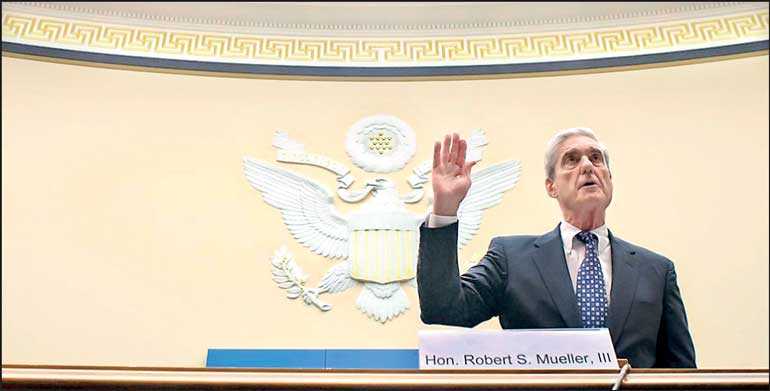Friday Feb 20, 2026
Friday Feb 20, 2026
Friday, 26 July 2019 00:00 - - {{hitsCtrl.values.hits}}

WASHINGTON (Reuters): Former Special Counsel Robert Mueller emphasised on Wednesday he had not exonerated Donald Trump of obstruction of justice, as the president has claimed, but his long-awaited congressional testimony did little to add momentum to any Democratic impeachment ambitions and Trump heartily declared victory.
In seven hours of congressional testimony, Mueller accused Trump of not always being truthful, called his support for the 2016 release of stolen Democratic emails “problematic” and said Russia would again try to interfere in the 2020 US elections.
“They are doing it while we sit here. And they expect to do it in our next election,” Mueller told lawmakers in back-to-back hearings on his inquiry into Russian interference in the 2016 US election to boost Republican Trump’s candidacy.
Despite Mueller’s assertion that Trump could be indicted after leaving office, the president was triumphant after the former FBI director’s appearances before the Democratic-controlled House of Representatives Judiciary and Intelligence committees.
“This was a very big day for the Republican Party. And you could say this was a great day for me, but I don’t even like to say that,” Trump said after Mueller’s lengthy and at times halting testimony during which he sometimes could not hear questions and had to correct at least one answer.
During a day of high-stakes political theatre, Mueller, 74, answered questions publicly for the first time on his investigation, with Democrats and Republicans taking familiar positions at a time of deep US partisan divisions.
The marathon televised hearings apparently left Democrats who control the House no closer to launching the impeachment process to try to remove the president even as he seeks re-election in 2020.
Mueller, for his part, refused to discuss the “impeachment issue.”
‘Democrats had nothing’ – Trump
“The Democrats had nothing,” Trump told reporters outside the White House as he was leaving on a trip to West Virginia. “And now they have less than nothing. And I think they’re going to lose the 2020 election very big, including congressional seats, because of the path that they choose.”
Democrats said they would go to court this week to enforce a subpoena of former White House counsel Don McGahn and to ask for grand jury material related to Mueller’s probe.
House Speaker Nancy Pelosi gave no sign she was speeding up her step-by-step approach to considering impeachment, saying: “We want to have the strongest possible case, to make a decision as to what path we will go down.”
Mueller spent 22 months investigating what he concluded was Russian interference in a “sweeping and systematic fashion” in the 2016 US election to help Trump as well as the president’s actions to impede the inquiry.
Mueller defended the inquiry’s integrity under repeated attack by Trump’s conservative Republican allies. The president lauded those lawmakers as “incredible warriors.”
Democrats who wanted Mueller to bolster their case for impeachment or provide game-changing testimony about the president, and Republicans who wanted to show that the investigation was a politically motivated hit job on Trump engineered by his enemies, may have come away frustrated.
Mueller, a reluctant witness who appeared only after being subpoenaed, often gave terse responses like “I can’t speak to that,” “I’m not going to get into that,” and “It is beyond my purview,” or merely referred lawmakers to the text of his 448-page investigative report.
The Judiciary Committee’s Democratic chairman, Jerrold Nadler, said Mueller had endured “repeated and grossly unfair personal attacks” and that no one, including Trump, was “above the law.” The Intelligence Committee’s Democratic chairman, Adam Schiff, accused Trump’s 2016 campaign of “disloyalty to country” for inviting, encouraging and making full use of Russian election meddling.
Republican lawmakers tried to paint Mueller’s investigation as unfair to the president, with Louie Gohmert telling the decorated Vietnam War veteran and longtime federal prosecutor: “You perpetuated injustice,” and Guy Reschenthaler calling the manner in which the inquiry was conducted “un-American.”
Mueller’s report, released in redacted form on April 18, did not reach a conclusion on whether Trump committed the crime of obstruction of justice with his actions aimed at undermining the inquiry, but did not exonerate him. The report also said the inquiry found insufficient evidence to establish that Trump and his campaign had engaged in a criminal conspiracy with Russia.
Trump has said the Mueller inquiry resulted in the president’s “complete and total exoneration.”